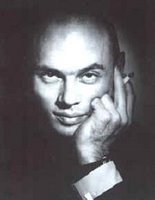Yul Brynner

Taidje Khan
1915 - 1985
Swiss /Russian, naturalized American born Sakhalin, Siberia
Height 5' 10" (1.78 m) . Exotic leading man of American films, famed as much for his completely bald head as for his performances. Brynner masked much of his life in mystery and in outright lies designed to tease the gullible, and it was not until the publication of a biography by his son in 1989 that many of the details of Brynner's early life became clear(er). He often claimed to be a half-Swiss, half-Japanese named Taidje Khan, born on the island of Sakhalin; in reality he was the son of Boris Bryner, a Swiss-Mongolian engineer and inventor, and Marousia Blagovidova, the daughter of a Russian doctor. He was born in their hometown of Vladivostok on 11 July 1915, and named Yul after his grandfather Jules Bryner. When Yul's father abandoned the family, his mother took Yul and his sister Vera to Harbin, China, where they attended a school run by the YMCA. In 1934 Yul's mother took her children to Paris. Her son was sent to the exclusive Lycée Moncelle, but his attendance was spotty. He dropped out and became a musician, playing guitar in the nightclubs among the Russian gypsies who gave him his first real sense of family. He met luminaries such as Jean Cocteau and became an apprentice at the Theatre des Mathurins. He worked as a trapeze artists with the famed Cirque d'Hiver company. He traveled to the U.S. in 1941 to study with acting teacher Michael Chekhov and toured the country with Chekhov's theatrical troupe. That same year he debuted in New York as Fabian in Twelfth Night (billed as Youl Bryner). After working in a very early TV series, "Mr. Jones and His Neighbors" (1944), he played on Broadway in Lute Song, with Mary Martin, winning awards and mild acclaim. He and his wife, actress Virginia Gilmore, starred in the first TV talk show, "Mr. and Mrs." (1948). Brynner then joined CBS as a television director. He made his film debut in Port of New York (1949). Two years later Mary Martin recommended him for the part he would always be known for: the King in Rodgers and Hammerstein's musical "The King and I". Brynner became an immediate sensation in the role, repeating it for film (The King and I (1956)) and winning the Oscar for Best Actor. For the next two decades he maintained a starring film career despite the exotic nature of his persona, performing in a wide range of roles from Egyptian pharaohs to Western gunfighters, almost all with the same shaven head and indefinable accent. In the 1970s he returned to the role that had made him a star, and spent most of the rest of his life touring the world in "The King and I". When he developed lung cancer in the mid-1980s, he left a powerful public service announcement denouncing smoking as the cause, for broadcast after his death. The cancer and its complications, after a long illness, ended his life. He remains one of the most fascinating, unusual and beloved stars of his time. Spouse Kathy Lee (1983 - 10 October 1985) (his death), Jacqueline de Croisset (1971 - 1981) (divorced) 2 children, Doris Kleiner (1960 - 1967) (divorced) 1 child, Virginia Gilmore (1944 - 1960) (divorced) 1 child.
Lost to the Revolution (1980) , Futureworld (1976) , Con la rabbia agli occhi (1976) , The Ultimate Warrior (1975) , Westworld (1973) , Serpent, Le (1973) , "Anna and the King" (1972) , Fuzz (1972) , Catlow (1971) , Romance of a Horsethief (1971) , The Light at the Edge of the World (1971) , Indio Black, sai che ti dico: Sei un gran figlio di... (1971) , The Magic Christian (1969) , The Madwoman of Chaillot (1969) , The File of the Golden Goose (1969) , Bitka na Neretvi (1969) , Villa Rides (1968) , The Long Duel (1967) , The Double Man (1967) , Triple Cross (1966) , Return of the Seven (1966) , Poppies Are Also Flowers (1966) , Cast a Giant Shadow (1966) , Morituri (1965) , Invitation to a Gunfighter (1964) , Flight from Ashiya (1964) , Kings of the Sun (1963) , Taras Bulba (1962) , Escape from Zahrain (1962) , Goodbye Again (1961) , The Magnificent Seven (1960) , Surprise Package (1960) , Testament d'Orphée, ou ne me demandez pas pourquoi!, Le (1960) , Once More, with Feeling! (1960) , Solomon and Sheba (1959) , The Sound and the Fury (1959) , The Journey (1959) , The Buccaneer (1958) , The Brothers Karamazov (1958) , Anastasia (1956) , The Ten Commandments (1956) , The King and I (1956) , General Foods 25th Anniversary Show: A Salute to Rodgers and Hammerstein (1954) , "Studio One" (1950) , "Fireside Theatre" (1949) , "Mr. Jones and His , Neighbors" (1944)


<< Home